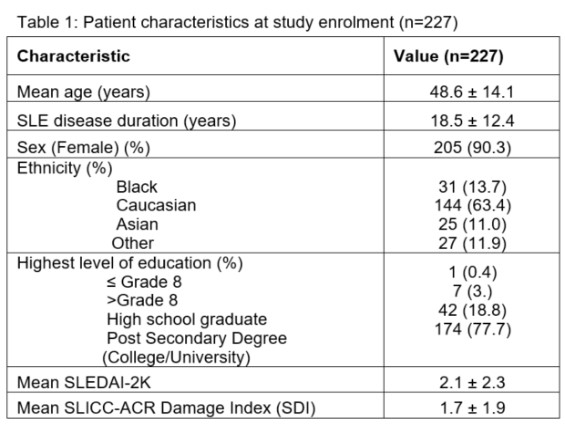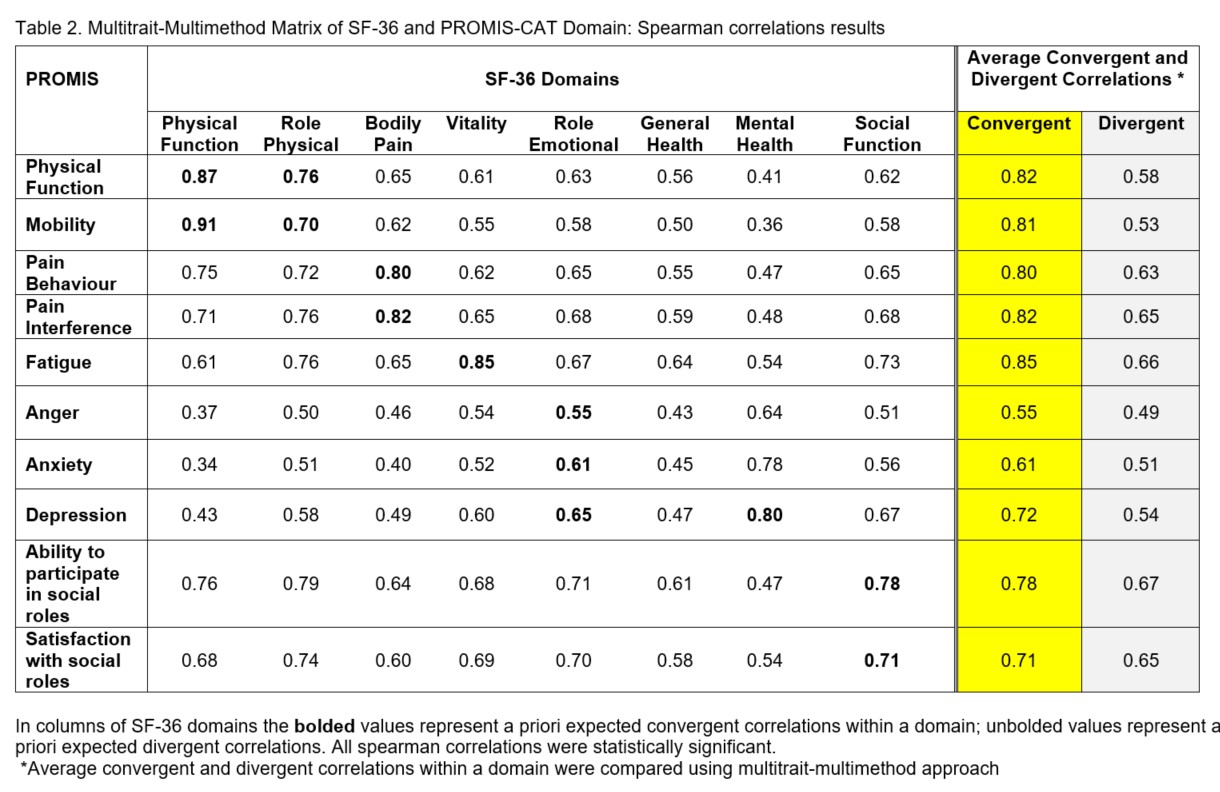Session Information
Date: Sunday, November 8, 2020
Title: SLE – Diagnosis, Manifestations, & Outcomes Poster II: Comorbidities
Session Type: Poster Session C
Session Time: 9:00AM-11:00AM
Background/Purpose: Use of The Patient Reported Outcomes Measurement Information System computerized adaptive test (PROMIS-CAT) in adults with systemic lupus erythematous (SLE) is an emerging research field. Previous studies showed PROMIS short forms are reliable and valid against the SF-36 in persons with SLE. Our previous research found that PROMIS-CAT scores have good-excellent reliability and moderate-high correlation with legacy instruments (e.g., Medical Outcomes Study Short-Form 36 Health Survey, (SF-36)). Here we aim to elaborate on the construct validity of PROMIS-CAT.
Methods: Consecutive consenting SLE patients (≥18 years old) attending a single center between July 2018 – Jan 2020 completed PROMIS-CAT and the SF-36 during clinical visits. Construct validity was evaluated comparing and contrasting hypothesized convergent correlations and divergent correlations using a multitrait-multimethod matrix approach comparing 10 PROMIS-CAT domain scores (Physical Function, Mobility, Pain Behaviour, Pain Interference, Fatigue, Anger, Anxiety, Depression, Ability to Participate in Social Roles, Satisfaction with Social Roles) with SF-36 subscale scores (Physical Function, Role Physical, Bodily Pain, Vitality, Role Emotional, General Health, Mental Health, Social Function).The multitrait-multimethod matrix approach compares a similar construct using 2 different tools (e.g. PROMIS-CAT and SF-36). We hypothesised that convergent correlations on average would have higher correlations than divergent correlations between SF-36 and PROMIS-CAT domains.
Construct validity was also tested using additional five a priori hypotheses to explore the relationships of PROMIS-CAT domains with corresponding SF-36 domains. We hypothesized that the following associations would be found, with at least moderately positive associations (r >0.3):
1) PROMIS-CAT Physical Function the SF-36 domains of Physical Function and Role Physical.
2) PROMIS-CAT Anger, Anxiety, and Depression with SF-36 Emotional Health scores.
3) PROMIS-CAT Ability to Participate in Social Roles and Satisfaction with SF-36 Social Roles.
4) PROMIS-CAT Fatigue with SF-36 Vitality.
5) PROMIS-CAT Depression with SF-36 Mental Health.
Results: Of the 227participants in the cohort, 90.3% were female, mean age at study enrolment was 48.6 ± 14.1 years, and mean disease duration was 18.5 ± 12.4 years (Table 1). The multitrait-multimethod matrix examining construct validity confirmed that the average convergent correlations were greater than the average divergent correlations for all domains (Table 2). All five a priori hypotheses were satisfied with moderate to strong correlations (Spearman correlation, r=0.55-0.87) between PROMIS-CAT and most SF-36 domains.
Conclusion: Our results provide evidence on the validity of PROMIS-CAT in an SLE Canadian cohort. The use of multi-trait multimethod analyses highlighted the convergent and divergent construct validity compared to legacy instrument. This is the first study to use multitrait-multimethod matrix analysis to establish validity support for the PROMIS-CAT and our results demonstrate encouraging results.
To cite this abstract in AMA style:
Moazzami M, Katz P, Bonilla D, Engel L, Su J, Akhavan P, Anderson N, Tayer-Shifman O, Beaton D, Touma Z. A Multitrait-Multimethod Matrix Approach to the Construct Validity of Patient Reported Outcomes Measurement Information System Computerized (PROMIS) Adaptive Tests (CAT) in Systemic Lupus Erythematous [abstract]. Arthritis Rheumatol. 2020; 72 (suppl 10). https://acrabstracts.org/abstract/a-multitrait-multimethod-matrix-approach-to-the-construct-validity-of-patient-reported-outcomes-measurement-information-system-computerized-promis-adaptive-tests-cat-in-systemic-lupus-erythematous/. Accessed .« Back to ACR Convergence 2020
ACR Meeting Abstracts - https://acrabstracts.org/abstract/a-multitrait-multimethod-matrix-approach-to-the-construct-validity-of-patient-reported-outcomes-measurement-information-system-computerized-promis-adaptive-tests-cat-in-systemic-lupus-erythematous/


